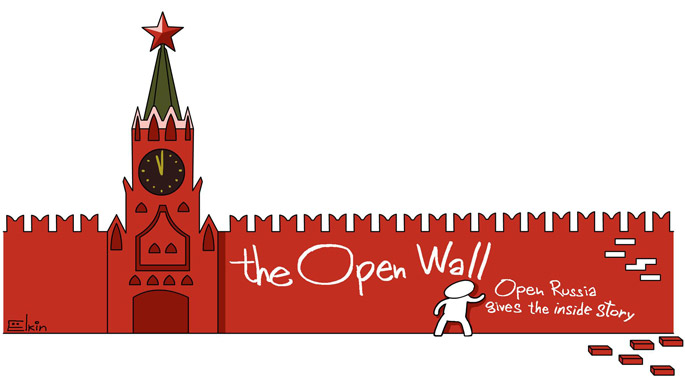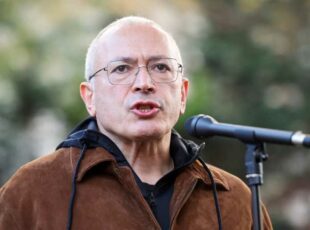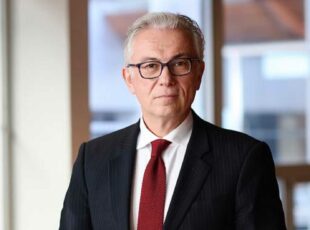Patriotic education

Patriotic education
On 19 August, Russia appointed a new Minister of Education and Science, Dr Olga Vasilyeva, whose entire academic life has been devoted to studying the relationship between the Russian Orthodox Church and the Russian state.

Because Vasilyeva was not unveiled to the public until the last moment (as most Kremlin appointees are), society has much to learn about her. Is it true, for instance, that she is not only a “strong patriot,” but also an inveterate Stalinist?
From 2012, Olga Vasilyeva worked in the Presidential Administration as Deputy Head of Public Project Management, whose brief included “patriotic education.” A Kremlin source for RBC revealed the nature of Dr Vasilyeva’s methods and target audience: “[She] gave frequent lectures about conservatism to [the ruling party] United Russia.”
One of these closed lectures is detailed by Kommersant: “According to one listener, Vasilyeva made it crystal clear that Stalin, for all his shortcomings, benefited the country, because in the pre-war period he busied himself with uniting the nation, reviving the heroes of pre-revolutionary Russia, and promoting Russian language and literature, which ultimately helped [the Soviet Union] to win the war.”
Not everybody agrees with that favourable interpretation. Lawyer and human rights activist Henri Reznik takes severe exception to it: “Before the war, Stalin almost completely decapitated the army, while the purges of the 1930s effectively erased the emerging, fragile intellectual elite in the Soviet republics that spoke Russian and promoted Russian culture.”
According to Novaya Gazeta, in early August, Vasilyeva told pro-Kremlin youth at a patriotic forum in Crimea that the ideal political figure in Russian culture is “a tsar who cares for the welfare of the people.”
Vasilyeva’s patriotic rhetoric smacks strongly of a 200-year-old tsarist motto: “Orthodoxy, Autocracy, Nationality” (the holy trinity that ensured imperial Russia’s salvation and prosperity). In today’s Russia, that autocratic and benevolent tsar is Vladimir Putin.
As for Orthodoxy, that too needs little explanation. Having devoted her entire career to it, Olga Vasilyeva is a firm believer in the Church’s ability to “strengthen the spiritual and moral foundations of Russian society.” And as an expert on the history of religion, Vasilyeva has never once overlooked the interests of the state, says literary critic and editor Gleb Morev. “The history of the Orthodox Church under Stalin is splattered with the blood and bullet-pierced brains of the priesthood. It’s a ghastly canvas. But for some, the smashed skulls are secondary to the ‘revival of the state,’ which was consolidated under Stalin, despite the carnage.”
As ever, “nationality” is trickier to pin down (it means different things at different times), but Vasilyeva equates it with patriotism:
“The interests of the nation are above the interests of the individual;”
“Patriotism is the one and only national idea;”
“Self-sacrifice is becoming a moral reserve.”
These grandiloquent phrases resonated in the ears of Vasilyeva’s young audience at the catchily titled “Terra Scientia on the Klyazma River” National Youth Educational Forum, which took place in late June, in Crimea …
It was less about instructing the youngsters than putting them to shame, the subtext being that some, if not all, should be willing to sacrifice themselves for the greater good. It was at the forum that Vasilyeva first mentioned Stalin in the specific context of patriotism. In 1931, having justified the Soviet Union’s claim to be the rightful heir to pre-1917 Russian history, Stalin (according to Vasilyeva) rehabilitated patriotism. The inference being that the second major rehabilitation of patriotism had to wait until Putin.
At the forum, Vasilyeva also referred to Stalin’ s purges. Apparently, the number of victims has been overstated. “I remember what happened in Moscow when Korotych took over Ogonyok [Vitaly Korotych became editor-in-chief of Ogonyok magazine in 1986 and made it a virtual mouthpiece of perestroika and glasnost]. The myths it spun were gobsmacking. If you tally up the victims according to Korotych, it’s a wonder there was anyone left in the country at all.”
Alexei Venediktov, editor-in-chief of Echo of Moscow, immediately withdrew from the Public Council at the Ministry of Education (set up to, inter alia, keep communication channels open with the public) on learning of Olga Vasilyeva’s appointment. “The views expounded by the new minister at her recent lecture at the Klyazma forum are not only out of sync with mine (that’s hardly the worst part), but are at variance with the Constitution of the Russian Federation on the point of secular education. The new minister is known to be in favour of expanding the teaching of religion in schools. I can only describe her views as obscurantist.”
In conversation with RBC, a source close to the Kremlin said that Vasilyeva’s 15-year acquaintance with Vladimir Putin’s spiritual confessor, Archimandrite Tikhon Shevkunov, had weighed heavily in her appointment to the ministerial post. Vasilyeva, says the source, speaks candidly of her warm feelings for Shevkunov, and “Father Tikhon epitomises much of what I want to see in the Russian priesthood.”
A Presidential Administration source told Vedomosti that the Kremlin likewise sees the appointment of Vasilyeva as a “radical revision” of state policy in the sphere of education. According to this source, since the early 1990s, education has been under “exceptionally strong” foreign (Western) influence, and the situation has to change, because teachers unversed in politics could become “die-hard Western agents of influence, extremists and radicals.”
Under Vasilyeva, then, Russian academia can expect Stalinist reprisals – updated. Whereas in the 1930s, university staff could be shown the door (or worse) for inadequate knowledge of Marxism-Leninism, today they will be “purged” for posting a liberal comment on Facebook , for unpatriotic comments in the media, or a publication in a Western scientific journal.
Pity the academics … but pity the children even more.



